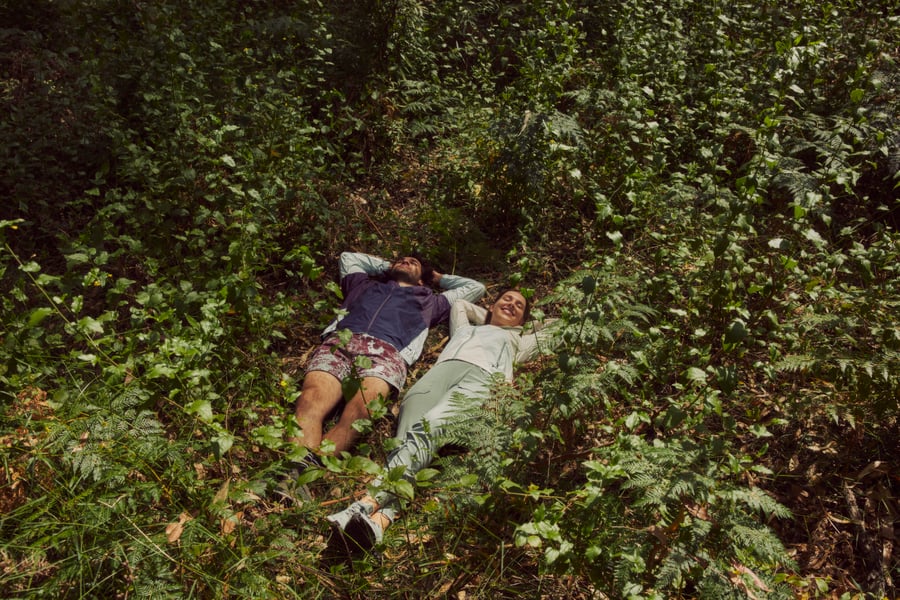Welcome to “Out There”, a collaborative series with Kathmandu. Across four articles, Rolling Stone explores the unique intersection between creativity and the great outdoors.
This article was created on the traditional lands of the Kulin Nation. We acknowledge their Elders past, present and emerging.
It begins, as always, with a mad rush.
We arrive at the station with moments to spare. With sushi in one hand and a duffel in the other, I search for a coveted four-seater. No such luck so it’s travelling backward in a two-seater for now.
As I watch factories give way to open tracts of undeveloped land I find myself less tense. We’re en route to Broomfield, a suburb sandwiched exactly halfway between Ballarat and Daylesford, to house-sit for out-of-town friends.
The further we pull away from the city, the more the nearing prospect of quietude calms me until I find myself involuntary staring out the carriage window, enamoured by the vast bareness of the beige landscape.
We arrive in Ballarat during a sleepy afternoon lull and are grateful to find a taxi waiting for us. A half hour later we’re opening the gate at Apple Tree Cottage.
As we settle in, I realise that I hear nothing except the noise I’m making—no whooshing of cars gone by, no piercing vacuum from the car wash across the road, no clatter from upstairs neighbours. It is still and I feel calm as I water the vegetables and tend to the animals.

Where do we find reprieve from it all in our increasingly busy lives? In which circumstances do we begin to hear our own voice with clarity? How often do we find ourselves in those circumstances? It is a constant struggle and there are few environments where we can detach from the quotidian humdrum of modern life. The first and crucial step is to swap concrete for canopy.

One summer years ago, I visited a lake just outside of Melbourne. Behind the lake stood a welcoming forest. A friend and I began to wander toward it until we were wandering through it, the dappled light calling us deeper into the damp and mossy surrounds. As dusk approached it dawned on us that we didn’t know how to leave.


It was, at first, disconcerting. But as we wandered deeper and wondered more deeply how we were going to retrace our steps, the environment seemed to accept us even more for our lostness. The oblique rays of the setting sun cast themselves longer until our shadows extended to the length of young fallen trees.

We sat down and were enveloped by the forest. In the solitude I felt no fear, only acceptance—both of the circumstances and of the forest. I don’t recall how we found our way out, but that experience imprinted itself on my mind, like a boot mark on moist undergrowth.
Despite our best efforts, we are becoming increasingly detached from nature. The proliferation of modern getaways replete with digital detoxes and curated contact with the natural world suggest an undercurrent of dissatisfaction with the way we are living in metropolises.
I appreciate these attempts to connect with nature, but suspect they temporarily alleviate symptoms rather than remedy the cause.

What, then, is the remedy? As always, there is no one simple solution. However, one antidote to the cacophony of modern life that is gaining traction is the practice is of “forest bathing” or shinrin-yoku. The term was created in 1982 by the Japanese Ministry of Agriculture, Forestry and Fisheries and, despite what it sounds like, doesn’t require an onsen.
Shinrin translates to “forest” and yoku translates to “bath”, so that the practice is of ‘bathing’ in the forest’s atmosphere—the damp coolness of the air, the sound of a slow-moving stream, the sensation of a mossy trunk.

Forests exist in our collective imagination as mystical places and remain a rich source of inspiration and place of reprieve for artists of all disciplines. The prolific writer Joyce Carol Oates said that “Distraction is our main adversary right now.” When we travel into the secluded serenity of a forest, that adversary seldom follows.

Standing in a clearing below towering trees I feel the relief of insignificance. Looking up toward the tops of these lanky and time-worn wooden relics I am reminded of my transience. These trees have peered up to, stood level with, and gazed down upon generations before me. Their roots stretch out labyrinthine, connecting to deeper layers of earth in search for new sources of sustenance.
The light is filtered as though through a mother’s protective hand, shielding eyes from powerful direct sunlight. The water runs cold over cleansing rock. The air a collective exhalation of oxygen-rich breath from thousands of salubrious plants. As I traverse the expansive forest floor, I am nourished by the forest’s energy.

As much as the forest is a window into a unique and tranquil world, it is also a sphere for self-reflection liberated from the urgency of modern life. Unsurprisingly, it is through this process of turning inward that we remind ourselves of our innate connection to the natural world.

Laying down ensconced in shrubbery and cushioned by pillowy soil, I finally hear nothing—not even the sound I’m making.
Ibrahim Khudeira is a creative writer and sommelier living in Naarm.
All talent are styled in Kathmandu. Feeling inspired for an adventure of your own? Explore the latest range now.






































